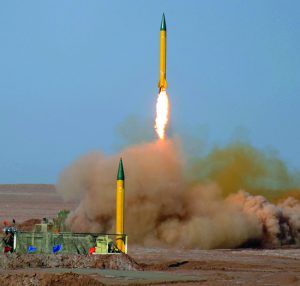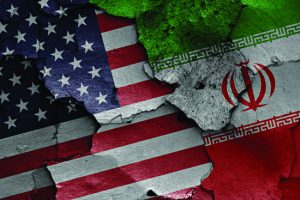×


We have detected your country as:
Please click here to go to the USA website or select another country from the dropdown list.
by: Joshua Spurlock, The Mideast Update

(Iran missile/nationalsecurity.news)
Words are cheap—unless they are written on ballistic missiles. And when Iranian media publicized that wiping Israel off the earth had literally been written, in Hebrew, on missiles tested by Iran, that was an expensive and deadly serious message. That brazen rhetoric was sandwiched between two threats from the leader of Iranian-proxy Hezbollah, Sayyed Hassan Nasrallah, to attack civilian chemical and nuclear facilities in Israel. It also came just months after Iranian media announced a Holocaust cartoon contest. Recall that all this occurred after the nuclear deal between Iran and the West that ended more than a decade of stalemate and sanctions. So after all that, why are Iran and its ally sounding worse than ever? It turns out that the nuclear deal is a key reason for the resurgence of Iran’s brash rhetoric.
Iran Is Testing the West
The nuclear deal was considered a historic breakthrough by many, but it was just a means to an end for Iran, according to Dr. Emily Landau, an expert on Iran and the head of the Arms Control and Regional Security Program with the Institute for National Security Studies in Israel (INSS). Dr. Landau noted that even during the discussions with the West, Iranian Supreme Leader Sayyed Ali Hosseini Khamenei made it clear they only wanted the nuclear deal and not better relations with the United States. For Iran, it was all about ending sanctions. During that time, the fact that Iran presented a “more accommodating” tone to get that deal isn’t surprising to Dr. Landau. But she says Iran “never changed” its basic nature and now they’re “pushing the envelope” to see how much the West will accept to keep the nuclear deal going.

Dr. Emily Landau
Institute for National Security Studies in Israel
(Dr. Emily Landau/www.nato.int)
One of the many problems with the Iranian nuclear deal is that it surrendered major sanctions in exchange for just one major issue—restrictions in the Iranian nuclear program. Iran is already complaining that the limited sanctions after the deal are counter to the spirit of the agreement, so slapping Iran with new sanctions for terrorism or missile tests could lead to an escalation in which Iran nixes the deal and gets back to racing for a nuclear weapon. Call it the nuclear “nuclear option.”
Speaking to The Mideast Update, Dr. Landau said that “the question is whether there’s political will” to be tough on Iran as the international community has been negotiating with Iran for a long time, “so they all sort of want this issue off the agenda.” And Iran is seeing just how far they can take that, with Dr. Landau noting that since the nuke deal was signed, Iran has not only tested missiles, but increased their troops in Syria too. Furthermore, she said the rhetoric is “serious” and aimed not for “internal consumption” but to send a message to the major world powers.
Iran’s Trek to Nuclear Weapons
Iran’s actions are every bit as dangerous as they appear. Dr. Landau noted that their latest missile tests were all about precision-guided accuracy, a key component that has been missing in Iran’s missile arsenal. What’s more, they are even working on intercontinental missile capabilities that could someday reach the United States. The three components of a nuclear weapons program, Dr. Landau noted, are the nuclear materials, the nuclear warhead technology and the ability to deliver it on a missile.
Iran can’t openly work on the first two components per their agreement, but it can and is working on missiles—because Dr. Landau noted the nuclear deal actually “watered down” the United Nations’ resolution on such tests from a violation for doing them to just a call not to do so. “[The West] tied their own hands from being able to say it’s a violation,” said Dr. Landau.
Iran’s Trick of the West
The West should have seen this coming. Dr. Landau noted that Iran violated sanctions on obtaining “dual-use” items that can have both civilian and aggressive purposes while the major world powers “basically ignored” the acquisition, early in 2015, so they wouldn’t rock the boat on getting a nuclear deal. Even the media played it down, according to Dr. Landau, with the focus on reaching a deal. Yet during the negotiation phase, an Iranian parliamentary leader still called Israel a cancer, and roughly a decade ago the so-called moderate Iranian President Hassan Rouhani boasted about tricking the West in that era’s nuclear talks, according to the Daily Telegraph. Looks like he did it again.

(Danielo/shutterstock.com)
However, all that could change if the West starts pushing back, argues Dr. Landau. Iran has it’s own motivation for keeping the nuclear deal—economic sanctions hammered their economy to the point that even a decade of restrictions on their nuclear program was worth getting the sanctions removed. A resolute US and Europe truly willing to re-impose those sanctions if Iran violates the deal—and willing to up the ante on their response to separate Iranian misdeeds like the missile tests in the meantime—would force Iran to choose between bravado and economic collapse again.
Dr. Landau encouraged the world powers “not to think rosy thoughts” that Iran will assent to the benefits of being integrated with the international community. “We’re not getting that message from Iran that they have any interest in that,” said Dr. Landau, “and I think that message coming from Iran needs to be taken seriously… to understand that they’re saying these things because they actually think them. And if that’s what they’re thinking, that needs to be confronted.”
All logos and trademarks in this site are property of their respective owner. All other materials are property of Bridges for Peace. Copyright © 2024.
Website Site Design by J-Town Internet Services Ltd. - Based in Jerusalem and Serving the World.